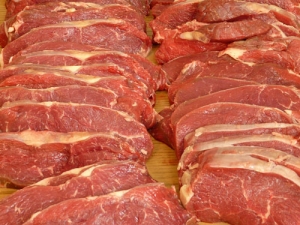MIA launches 2026 Red Meat Sector Dragon’s Den for innovative ideas
The Meat Industry Association (MIA) is once again looking for game-changing ideas for New Zealand's red meat processing and exporting sector.
 The Free Trade Agreement (FTA) with Korea is a significant step towards reducing the overall amount of tariffs paid on New Zealand red meat exports.
The Free Trade Agreement (FTA) with Korea is a significant step towards reducing the overall amount of tariffs paid on New Zealand red meat exports.
The red meat sector welcomes the announcement today that all steps are now completed to enable the Korea-New Zealand Free Trade Agreement to enter into force before the year end.
The Free Trade Agreement (FTA) with Korea is a significant step towards reducing the overall amount of tariffs paid on New Zealand red meat exports.
Tariffs of almost $323 million were paid on New Zealand red meat exports in 2014. A significant proportion of those tariffs were paid in Korea ($64 million) – where applied tariffs are 40% on beef.
The Korea FTA is critical for New Zealand sheep and beef farmers and meat exporters, ensuring New Zealand remains competitive in this key market.
Korea is New Zealand's fourth-largest beef market by volume, taking nearly $123 million of beef exports last year.
However, trade volumes have dropped in recent years, partly due to competitors such as the United States, and more recently Australia and Canada, having a tariff advantage through their FTAs with Korea.
New Zealand red meat exports will benefit from two rounds of tariff cuts in quick succession – the first on entry-into-force of the agreement on 20 December, and a second round of cuts on 1 January 2016.
Beef + Lamb New Zealand (B+LNZ) and the Meat Industry Association (MIA) work together to improve access for sheep and beef products to overseas markets, including by providing in-depth analysis in support of the Government's FTA negotiation efforts.
The Roar is a highlight of the game hunting calendar in New Zealand, with thousands of hunters set to head for the hills to hunt male stags during March and April.
OPINION: The past few weeks have been tough on farms across the North Island: floods and storms have caused damage and disruption to families and businesses.
European dairy giant Arla Foods celebrated its 25th anniversary as a cross-border, farmer-owned co-operative with a solid half-year result.
The sale of Fonterra’s global consumer and related businesses is expected to be completed within two months.
Fonterra is boosting its butter production capacity to meet growing demand.
For the most part, dairy farmers in the Waikato, Bay of Plenty, Tairawhiti and the Manawatu appear to have not been too badly affected by recent storms across the upper North Island.

OPINION: Meanwhile, red blooded Northland politician Matua Shane Jones has provided one of the most telling quotes of the year…
OPINION: This old mutt has been around for a few years now and it seems these ‘once in 100-year’ weather…